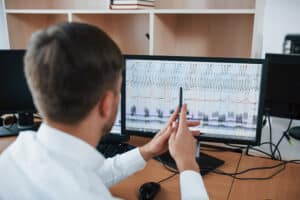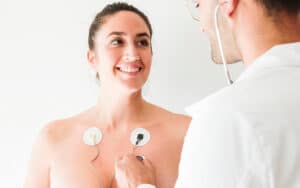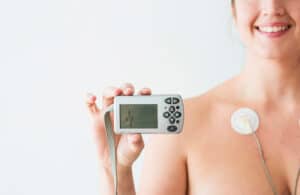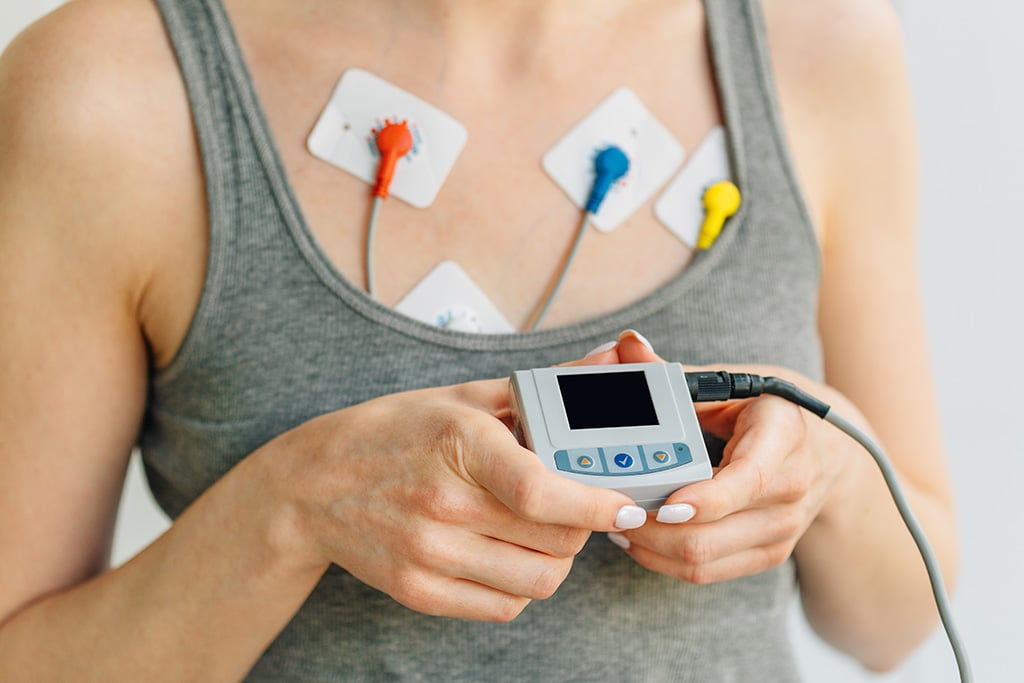An ECG holter for cardiac monitoring.
Here at Melbourne Heart Care we specialise in providing electrocardiogram (ECG) holter monitoring with the results guiding appropriate therapy for your heart health.
Holter monitors are a portable device used to capture your heart’s rhythm and rate over a 24 hour time period, or longer. It is a non-invasive and painless test used to record and analyse your heart’s electrical activity. The compact and portable holter monitor will provide your cardiologist or healthcare provider with crucial information about your heart’s performance throughout your normal daily routine.
Why do people have an ECG holter monitor test?
A traditional ECG may not provide enough details about the condition of your heart to form an accurate diagnosis. In this case, your GP or cardiologist will request a holter monitor. Your doctor may suspect you have abnormal or transient disturbances in your heart’s rhythm that the ECG couldn’t capture, such as an irregular heartbeat. This can cause symptoms, such as:
- Chest pain or discomfort
- Heart palpitations
- Lightheadedness or dizziness
- Unexplained fainting
- Shortness of breath
- Fatigue
- Diminished exercise tolerance
Simply put, this wearable device monitors your heart continuously to detect and diagnose abnormal heart beats and rhythms. Other reasons and benefits of a holter monitor test are:
- To assess your risk of heart-related events in the future.
- To check the functioning of a permanent pacemaker.
- To assess the effectiveness of heart medications and other cardiac treatment.
- For monitoring of specific activities or events.
- For long-term monitoring of cardiac conditions.

The holter monitor provides detailed data about your heart’s activity over 24 to 48 hours.
How does an ECG holter device work?
Sticky dots, known as electrodes, about the size of a 20 cent coin are attached to your chest that pick up the electrical impulses in your heart. The electrodes capture important data, such as heart rate and rhythm. The information is stored in the holter monitor where it is later analysed to determine what is causing your symptoms and how your heart is functioning.
What is the procedure for holter monitor testing?
Before undergoing your ambulatory ECG monitoring, it’s important to know what to expect.
How to prepare for an ECG holter monitor test.
You will be provided with instructions and advice regarding medication and activities prior to your test. Once the holter monitor is attached you won’t be able to shower or bathe until it is removed, so we suggest having a shower prior to your appointment. Don’t apply any lotions or cream to your chest and come to your appointment wearing loose, comfortable clothing.
Wearing your holter monitor.

The sticky dots and wires are attached by your doctor or other health care provider. The leads are then connected to the monitor and it is programmed to record your heart for a set period of time.
At your provider’s office a member of the health care team will place the electrodes on your chest. If you have a hairy chest they may need to shave areas to ensure the electrodes stick to your skin. These electrodes connect to leads from the mobile phone sized holter monitor, fitted to a strap you can wear around your neck or shoulder, or it can be clipped to a belt.
Typically the duration of the monitoring period will be 24 to 48 hours. This allows time for any irregular heartbeat or other cardiac issues to be recorded.
Once you leave the office, you can go about your regular daily routine and usual activities. However, you can’t get the holter monitor wet. You may be asked to keep a patient diary of your activities and to record the time if you feel symptoms.
Once the monitoring time period is over, you will return to your doctor’s office and they will remove the device.
Understanding the results.
Your cardiologist will compare your journal and symptoms with the event monitor data collected whilst wearing the holter monitor for accurate interpretation of your results. They will use this to:
- Identify abnormal heart rhythms.
- Assess changes in the rate of your heart beat
- Correlate any reported symptoms with recorded heart activity
- Recommend follow-up actions based on the results.
Limitations and considerations
Whilst continuous cardiac monitoring is a valuable diagnostic tool, there can be some potential limitations. For example, if an arrhythmia occurs infrequently or sporadically it may not be captured during the 24 hours of monitoring. A loop recorder may provide further insights if this is the case.
There are also some medications that can affect your heart rhythm and rate, therefore masking or altering your results. Your cardiologist or GP will inform you of what medications you may need to decrease or stop prior to your test.
It is also important to maintain your usual activity level. This provides the most accurate representation of your heart during your day to day life.
Special considerations for elderly patients.
- Skin sensitivity: The skin of elderly individuals may be more fragile and prone to irritation. Care should be taken during the placement and removal of the electrodes to minimise any skin damage.
- Mobility and dexterity: Elderly patients may have reduced mobility or dexterity, making it challenging for them to handle the device or properly attach the electrodes. Healthcare providers should provide clear instructions and assistance as needed.
- Medication management: Elderly patients often take multiple medications, which may impact heart rate or rhythm. It’s important for healthcare providers to consider the potential effects of these medications on the ECG Holter monitoring results and weigh up the risks and benefits of stopping those medications for the test.
Special considerations for paediatric (children) patients.
- Size and comfort: Paediatric patients have smaller bodies, so it’s crucial to use appropriately sized ECG electrodes and a compact holter monitor device to ensure comfort and proper signal acquisition.
- Cooperation and compliance: Children may be more active or restless, which can affect the positioning of the electrodes and the quality of the recorded data. Healthcare providers may need to take additional measures to ensure the child remains calm and cooperative.
- Parental involvement: Involving parents or caregivers is essential when performing cardiac monitoring on children. They can assist in explaining the procedure to the child, ensuring proper electrode placement, and keeping the child comfortable throughout the monitoring period.
Possible risks or complications associated with the procedure.

Your doctor will assess the results of your test and provide recommendations for your steps, such as further diagnostic tests or treatment.
This is a non-invasive test and carries no significant risks or potential complications. Some people may develop skin irritation from the electrodes. There are also some devices that can interfere with the signal between the electrodes and the holter monitor. We recommend you avoid some electrical appliances, such as:
- Electric toothbrushes
- Electric razors
- Magnets
- Electric blanket
- Microwaves.
Next steps
ECG holter monitor testing plays a vital role in assessing your heart’s function, and detecting cardiac issues such as abnormal heart rhythms. Once your doctor has your results they will discuss the specific concerns and determine appropriate next steps, which may include further testing, treatments or lifestyle adjustments.
Melbourne Heart Care is here to help
Our dedicated Melbourne Heart Care team provide comprehensive and tailored treatment for your heart health. We provide support, education, diagnostic tests and high-quality cardiac treatment using state-of-the-art equipment.
Your heart health matters, and we are here to provide you with comprehensive cardiac care every step of the way.

